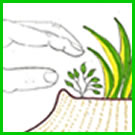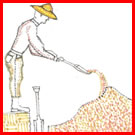This OL 304 Student Resource Page has three sections that can easily be reached by clicking on the red links just below.
Read the Class Homepage First.
1. Download Documents. This is where you can download Word, Excel and PDF documents that can save as course resources for future projects and use as templates for the assignments.
2. The Course Website. Webpage versions of the discussions and assignments for each week.
3. Read this first: The Class Home Page. This gives you an overview of the course and also sets up the course logistics.
Links on this OL 304 Student Resource Page:
OL 304 Vegetable Garden Care
https://csd-i.org/vegetable-garden-care-family-gardens-community-gardens/
OL 304 Assignment One Homework PDF 35K
Magee Example Project OL 304 Assignment 1 Word Document to 35K
OL 304 Assignment 1 Discussion PDF 35K
Garden Africa: Water Management
The Sustainable Nutrition Manual: There is a very good information in this book. There is also a more comprehensive baseline study form that you can look at as a comparison to the rapid appraisal techniques that we are using for our baseline study.
IDEP – A Resource Book For Permaculture – Solutions for Sustainable Lifestyles
Which includes these chapters:
IDEP Home & Community Gardens Module 6: IPM
IDEP Home & Community Gardens Facilitator Handbook Module 6: IPM
IDEP – A Facilitator’s Handbook For Permaculture – Solutions for Sustainable Lifestyles
Permaculture Manual – Garden Africa
Permaculture Manual Trainers Reference Manual- Second Edition
Healthy Harvest: A training manual for community workers in good nutrition, and the growing, preparing and processing of healthy food.
OL 304 Assignment Two Homework PDF 35K
Magee Example Project OL 304 Assignment 2 Word Document 35K
OL 304 Assignment 2 Discussion PDF 35K
Companion Planting and Pest Management – Garden Africa: Word Document
IDEP Home & Community Gardens Module 9: IPG
OL 304 Assignment Three Homework PDF 35K
Magee Example Project OL 304 Assignment 3 Word Document 35K
OL 304 Assignment 3 Discussion PDF 35K
OL 304 Assignment Four Homework PDF 35K
Magee Example Project OL 304 Assignment 4 Word Document 35K
OL 304 Assignment 4 Discussion PDF 35K
IDEP Home & Community Gardens Module 4: Soil
Creating Your Own Compost- Garden Africa Word Document
Soil – Garden Africa 1 PDF
Soil – Garden Africa 2 PDF
OL 304 Assignment Five Homework PDF 35K
Magee Example Project OL 304 Assignment 5 Word Document 35K
OL 304 Assignment 5 Discussion PDF 35K
Garden Africa: Water Management
The Sustainable Nutrition Manual: There is a very good information in this book. There is also a more comprehensive baseline study form that you can look at as a comparison to the rapid appraisal techniques that we are using for our baseline study.
IDEP – A Facilitator’s Handbook For Permaculture – Solutions for Sustainable Lifestyles
IDEP Workshop Resources 2: Participant Handouts: pp. 47 – 48
Permaculture Manual – Garden Africa
Permaculture Manual Trainers Reference Manual- Second Edition
OL 304 Assignment Six Homework PDF 35K
Magee Example Project OL 304 Assignment 6 Word Document 36K
OL 304 Assignment 6 Discussion PDF 35K
Evaluation Form for Food Security, Nutrition and Home Gardens 1
Welcome to the Center for Sustainable Development’s online learning course OL 304 Vegetable Garden Care and Maintenance where community members will learn how to care for the garden, how to increase family understanding of nutrition – including using delicious, nutrition packed recipes, and how to plan for next season’s garden.
You have signed up for a specific course within specific dates. If you are not able to complete the course within these dates, the Center allows you to take the course again for 50% of the normal course fee if you enroll in the very next scheduled course and use the very same project. Unfortunately, we can’t make exceptions.
Please feel free to review E-Mail and Homework Etiquette in the Download Class Documents as a refresher. Course participants who successfully complete a course on time will receive a course certificate. Learn the full details.
Your certificate will be e-mailed 30 days after the end of your course.
Be sure to look there under the heading “OL 304 Class Links Specific to This Course” for an array of documents and sites to explore for this course. Discussions will be posted on their own pages rather than here each week.
 |
Week 1: Kitchen Gardens: Care & Maintenance. This workshop will address proper watering, weeding – and fertilizing with locally available manures. We will also discuss garden architecture such as fencing, stakes and plant supports. |
 |
Week 2: Kitchen Gardens: Pests. Pests can contribute to the early death of plants, and can ruin individual fruits or vegetables. Surrounding tempting food plants like tomatoes with garlic, or mixing a variety of crops together in the same bed can mislead insects about location. |
 |
Week 3: Nutrition, Meal Planning & Cooking. Children need more than grain for growth & vitality. They also need fats, calories, proteins, vitamins & micronutrients. Participants learn how to plan & prepare balanced meals that are appetizing, healthy & utilize produce from their new gardens & about budgeting & group bulk buying. |
 |
Week 4: Kitchen Gardens: Soil and Compost. Soil is a living, breathing organism of sand, clay, organic matter, earthworms, nutrients, minerals, water and plant roots. It can suffer from being to acid, too wet, too dry and too sandy. This workshop will detail the importance soil handling and of introducing compost and manure. |
 |
Week 5: Special Problems. Many places in the world have special challenges like desert soil, steep rocky soil, depleted soil, a shortage of water or a lack of space for a garden. We will look at these special challenges that may be specific to your project, seek solutions and incorporate them into garden strategy. |
 |
Week 6: Seedlings. In the first garden, we planted seeds directly into the garden bed. In preparation for an expanded garden, we will plant some seed in containers and transfer them to the garden bed after 2 months. We will select new crops & discuss planning for an expanded variety of healthy fruits & vegetables. |
Let’s go!
So what’s next? Click on the Assignment One Discussion and get started in family food and nutrition!
Tim Magee
Copyright © 2008-2024, Center for Sustainable Development, Inc. All rights reserved. CSDi is a U.S. registered 501(c)(3) nonprofit organization that specializes in providing sound, evidence-based information, tools and training for climate change and sustainable development for development and nonprofit professionals worldwide. Visit our training catalogue.